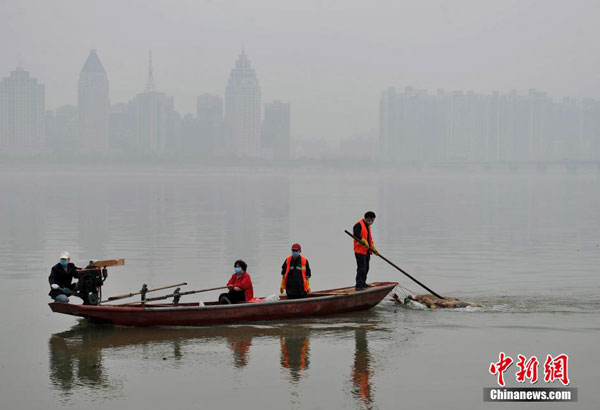China fights to combat water pollution
 0 Comment(s)
0 Comment(s) Print
Print E-mail Xinhua, March 22, 2014
E-mail Xinhua, March 22, 2014
China was plunged into a safe drinking water crisis this week when it was confirmed that at least 131 dead pigs had been dumped into one of the country's major rivers.
|
|
| At least 131 dead pigs had been dumped into Ganjiang River in east China's Jiangxi Province, which provides drinking water to the provincial capital of Nanchang. [Liu Zhankun/CNS] |
The 758-km-long Ganjiang River in east China's Jiangxi Province provides drinking water to the provincial capital of Nanchang.
Nanchang's water authority confirmed on Wednesday that it had pulled out the dead pigs from a section of the river, which is a major tributary of the Yangtze River.
The incident, which happened days before World Water Day on Saturday, has led to public concern, despite attempts by local authorities to reassure residents that drinking water was safe.
In March 2013, thousands of pig carcasses were retrieved from the Huangpu River in Shanghai, which provides 22 percent of the city's tap water.
Also last year, a leakage of aniline in Shanxi Province affected drinking water in neighboring Hebei Province.
Earlier this month, Chinese Premier Li Keqiang delivered his first government work report. In the document, the government vowed to implement a clean water action plan, strengthen the protection of drinking water sources and prevent and control water pollution in key river basins.
Over 70 billion yuan will be spent this year on major water projects.
Cost of urbanization
"China's urbanization rate has exceeded 50 percent. Based on international experience this would have affected the increase in water pollution incidents," said Vice Minister of Housing and Urban-Rural Development Qiu Baoxing.
"The country will pay an extremely high cost if it does not do something," he said.
About 280 million residents in China drink unsafe water, the Ministry of Environmental Protection revealed in a report this month.
The report also said that 110 million people live less than 1 km away from at least one industrial site that may have a pollution problem.
Moreover, about 140 million people live within 50 meters of a major road, it said.
Underground water remains a serious problem for Chinese cities.
A Ministry of Land and Resources report showed that the underground water quality of 40.3 percent of 4,727 monitored sites was "bad", and that of another 14.7 percent was "extremely bad" in 2011.
The tests were conducted in 200 cities.
Combating water pollution
The State Council passed a five-year plan in 2011 aimed at ensuring the rural population has access to safe drinking water.
By the end of next year, the Chinese government hopes to have solved drinking water problems for 298 million rural residents, according to the plan.
Local governments have also realized that developing an economy can lead to heavy costs in more ways than one.
Zhejiang Province, which has a booming private sector, has realized growth has come at a cost to the environment.
The coastal province's rivers used to be well supplied with water. Now, per capita water resources are below the national average.
Last year it set up a "River Duty Officer" system, in which an officials is held accountable for pollution in a designated river.
"Three municipal leaders in Jinhua City have been removed from their posts and seven others were punished for negligence in tackling water pollution," said Xia Baolong, secretary of the provincial committee of the Communist Party of China.
As China focuses on quality growth, local magistrates will also get tough on pollution.
"Reassuringly, central and local governments are making efforts," said Ni Junhua, head of Green Zhejiang, an environmental NGO.







Go to Forum >>0 Comment(s)